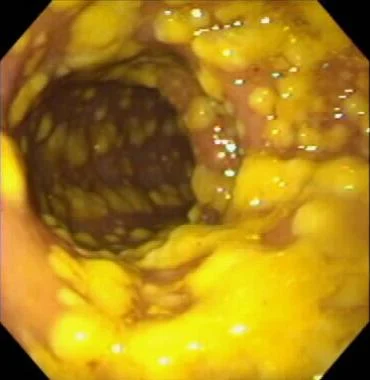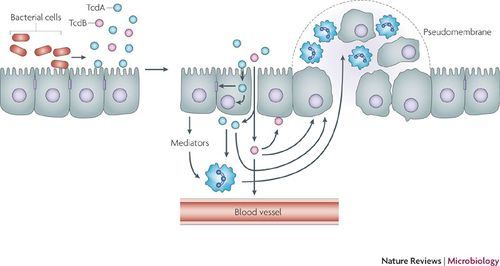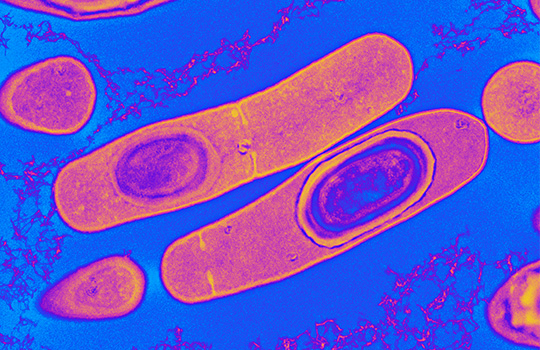1/ While on my current GI rotation, I& #39;ve been reading about Clostridioides difficile because, you know, #IDNerd. I ran across something I had not learned about before:
A Hypervirulent Strain of CDiff!
So naturally, I had to look into this.
/thread #Tweetorial #CDiff #IDTwitter
A Hypervirulent Strain of CDiff!
So naturally, I had to look into this.
/thread #Tweetorial #CDiff #IDTwitter
2/
What is the name of the strain of hypervirulent CDiff?
What is the name of the strain of hypervirulent CDiff?
3/
The hypervirulent strain of CDiff is known as NAP1/B1/027, which stands for North American pulsed-field gel electrophoresis type 1, restriction endonuclease analysis type B1, PCR ribotype O27.
That& #39;s a mouthful.
So what& #39;s the big deal about this strain?
The hypervirulent strain of CDiff is known as NAP1/B1/027, which stands for North American pulsed-field gel electrophoresis type 1, restriction endonuclease analysis type B1, PCR ribotype O27.
That& #39;s a mouthful.
So what& #39;s the big deal about this strain?
4/
NAP1/B1/027 has more antimicrobial resistance (esp FLQs), increased severity, and higher mortality compared to other CDiff strains. Additionally, it spreads more easily in the hospital.
Prevalence of NAP1/B1/027 is ~22-36% in North America & is the predominant strain.
NAP1/B1/027 has more antimicrobial resistance (esp FLQs), increased severity, and higher mortality compared to other CDiff strains. Additionally, it spreads more easily in the hospital.
Prevalence of NAP1/B1/027 is ~22-36% in North America & is the predominant strain.
5/
Why is NAP1/B1/027 thought to be more pathogenic?
First, we must understand CDiff virulence factors.
CDiff produces two toxins:
- Enterotoxin A (Toxin A produced by TcdA gene)
- Cytotoxin B (Toxin B produced by TcdB gene)
Why is NAP1/B1/027 thought to be more pathogenic?
First, we must understand CDiff virulence factors.
CDiff produces two toxins:
- Enterotoxin A (Toxin A produced by TcdA gene)
- Cytotoxin B (Toxin B produced by TcdB gene)
6/
Enterotoxin A destroys actin https://abs.twimg.com/emoji/v2/... draggable="false" alt="➡️" title="Rightwards arrow" aria-label="Emoji: Rightwards arrow">epithelial cell necrosis &
https://abs.twimg.com/emoji/v2/... draggable="false" alt="➡️" title="Rightwards arrow" aria-label="Emoji: Rightwards arrow">epithelial cell necrosis &  https://abs.twimg.com/emoji/v2/... draggable="false" alt="⬆️" title="Upwards arrow" aria-label="Emoji: Upwards arrow">cytokines/inflammation.
https://abs.twimg.com/emoji/v2/... draggable="false" alt="⬆️" title="Upwards arrow" aria-label="Emoji: Upwards arrow">cytokines/inflammation.
Cytotoxin B destroys tight junctions https://abs.twimg.com/emoji/v2/... draggable="false" alt="➡️" title="Rightwards arrow" aria-label="Emoji: Rightwards arrow"> increased vasc permeability & hemorrhage.
https://abs.twimg.com/emoji/v2/... draggable="false" alt="➡️" title="Rightwards arrow" aria-label="Emoji: Rightwards arrow"> increased vasc permeability & hemorrhage.
Enterotoxin A destroys actin
Cytotoxin B destroys tight junctions
7/
NAP1/B1/027 has both toxin A & B production.
However, it also has a deletion in the TcdC gene, which normally functions to regulate toxin A & B. This mutation leads to unregulated production of toxin A & B.
NAP1/B1/027 has both toxin A & B production.
However, it also has a deletion in the TcdC gene, which normally functions to regulate toxin A & B. This mutation leads to unregulated production of toxin A & B.
8/
NAP1/B1/027 also has a gene that produces binary toxin (AKA CD196 ADP-ribosyltransferase; CDT).
Binary toxin has two parts (hence its name): CDTa & CDTb
CDTa acts on actin via depolymerization leading to cytoskeleton destruction.
CDTb increases uptake of CDTa in the gut.
NAP1/B1/027 also has a gene that produces binary toxin (AKA CD196 ADP-ribosyltransferase; CDT).
Binary toxin has two parts (hence its name): CDTa & CDTb
CDTa acts on actin via depolymerization leading to cytoskeleton destruction.
CDTb increases uptake of CDTa in the gut.
9/
Lastly, NAP1/B1/027 has been shown to have increased sporulation, which allows it to spread more easily in its environment.
Lastly, NAP1/B1/027 has been shown to have increased sporulation, which allows it to spread more easily in its environment.
10/
In summary:
- CDiff has a hypervirulent strain named NAP1/B1/027
- Virulence factors of this strain include https://abs.twimg.com/emoji/v2/... draggable="false" alt="⬆️" title="Upwards arrow" aria-label="Emoji: Upwards arrow">toxin A & B via TcdC mutation, binary toxin production (CDTa & CDTb) & increased sporulation
https://abs.twimg.com/emoji/v2/... draggable="false" alt="⬆️" title="Upwards arrow" aria-label="Emoji: Upwards arrow">toxin A & B via TcdC mutation, binary toxin production (CDTa & CDTb) & increased sporulation
- NAP1/B1/027 has https://abs.twimg.com/emoji/v2/... draggable="false" alt="⬆️" title="Upwards arrow" aria-label="Emoji: Upwards arrow">antimicrobial resistance & worse morbidity/mortality
https://abs.twimg.com/emoji/v2/... draggable="false" alt="⬆️" title="Upwards arrow" aria-label="Emoji: Upwards arrow">antimicrobial resistance & worse morbidity/mortality
In summary:
- CDiff has a hypervirulent strain named NAP1/B1/027
- Virulence factors of this strain include
- NAP1/B1/027 has
11/ Here are my references on this topic:
https://www.ncbi.nlm.nih.gov/pmc/articles/PMC6440555/">https://www.ncbi.nlm.nih.gov/pmc/artic... https://www.ncbi.nlm.nih.gov/pmc/articles/PMC4049931/">https://www.ncbi.nlm.nih.gov/pmc/artic...
https://www.ncbi.nlm.nih.gov/pmc/articles/PMC6440555/">https://www.ncbi.nlm.nih.gov/pmc/artic... https://www.ncbi.nlm.nih.gov/pmc/articles/PMC4049931/">https://www.ncbi.nlm.nih.gov/pmc/artic...

 Read on Twitter
Read on Twitter
 epithelial cell necrosis & https://abs.twimg.com/emoji/v2/... draggable="false" alt="⬆️" title="Upwards arrow" aria-label="Emoji: Upwards arrow">cytokines/inflammation.Cytotoxin B destroys tight junctionshttps://abs.twimg.com/emoji/v2/... draggable="false" alt="➡️" title="Rightwards arrow" aria-label="Emoji: Rightwards arrow"> increased vasc permeability & hemorrhage." title="6/ Enterotoxin A destroys actinhttps://abs.twimg.com/emoji/v2/... draggable="false" alt="➡️" title="Rightwards arrow" aria-label="Emoji: Rightwards arrow">epithelial cell necrosis & https://abs.twimg.com/emoji/v2/... draggable="false" alt="⬆️" title="Upwards arrow" aria-label="Emoji: Upwards arrow">cytokines/inflammation.Cytotoxin B destroys tight junctionshttps://abs.twimg.com/emoji/v2/... draggable="false" alt="➡️" title="Rightwards arrow" aria-label="Emoji: Rightwards arrow"> increased vasc permeability & hemorrhage." class="img-responsive" style="max-width:100%;"/>
epithelial cell necrosis & https://abs.twimg.com/emoji/v2/... draggable="false" alt="⬆️" title="Upwards arrow" aria-label="Emoji: Upwards arrow">cytokines/inflammation.Cytotoxin B destroys tight junctionshttps://abs.twimg.com/emoji/v2/... draggable="false" alt="➡️" title="Rightwards arrow" aria-label="Emoji: Rightwards arrow"> increased vasc permeability & hemorrhage." title="6/ Enterotoxin A destroys actinhttps://abs.twimg.com/emoji/v2/... draggable="false" alt="➡️" title="Rightwards arrow" aria-label="Emoji: Rightwards arrow">epithelial cell necrosis & https://abs.twimg.com/emoji/v2/... draggable="false" alt="⬆️" title="Upwards arrow" aria-label="Emoji: Upwards arrow">cytokines/inflammation.Cytotoxin B destroys tight junctionshttps://abs.twimg.com/emoji/v2/... draggable="false" alt="➡️" title="Rightwards arrow" aria-label="Emoji: Rightwards arrow"> increased vasc permeability & hemorrhage." class="img-responsive" style="max-width:100%;"/>



